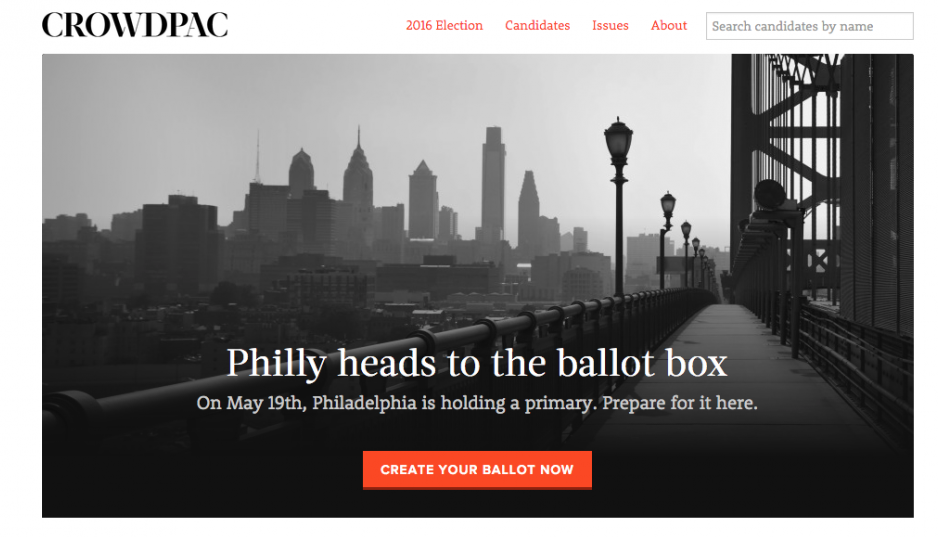Unhappy With the Mayoral Options? Next Time, Make a Pledge for Someone Better
For over a year, the unofficial slogan of the 2015 Mayor’s Race has been THESE CANDIDATES SUCK. Nothing’s really changed that. Even as we’ve gotten to know the candidates better through the debates, the Q&As and the television ads, public interest in this election is running low and that’s at least partly because many voters find the candidates uninspiring.
Before the mayoral field gelled into its mediocre reality, speculation was rampant about what other figures might be lured into the ring. Alba Martinez? Nope. Seth Williams? Not happening. Vincent Hughes? Nooo. Paul Levy? Not a chance. Richard Negrin? Not this time. Michael DiBerardinis? Nope again.
But what if there was a new way for voters to recruit candidates? One that didn’t require potential public servants to court PACs or do polling before entering the race? Well, Crowdpac — the political-data-crunching website introduced to Philly by Citified last week — has dreamed up an alternative method of supporting prospective candidates. Basically, it’s Kickstarter for politicians. And if it catches on, the new platform could provide a populist counter-weight to super PACs.
Crowdpac’s FEC-approved system allows anyone to pledge money upfront to a potential candidate. Donors are only charged, however, if the would-be politico actually runs for office. This system wasn’t ready in time for Philadelphia’s 2015 municipal elections, but it’s scheduled to be up and running for all races — local, state, federal — in 2016.
In theory, at least, this sort of system could give prospective candidates a chance to see what sort of grassroots financial support might be available to them, if they were to run. If the number is big enough, it could encourage quality candidates to get off the sidelines and into the race. Pledged money is a pretty good barometer for public interest in a candidate. After all, plunking down cash is a more telling indicator of voters’ interest than something as fickle as liking a campaign Facebook page — or as noncommittal as an anonymous poll.
The Kickstarter-esque format plays into Crowdpac’s mission of rethinking campaign contributions in the post-Citizens United world. “What that really involves is diluting the power of the big-money donors,” says CEO Steve Hilton, a former senior advisor to British Prime Minister David Cameron. “In a weird way, the answer to the problem of money in politics is putting more money in — more money from more people.”
For voters, the crowd-funding mechanism is coupled with Crowdpac’s search database, where you can find politicians who share a particular range of views and characteristics. For example, if you wanted to research (or donate to) a female Congressional candidate who leans liberal on Intelligence and Surveillance issues, happens to be running in a swing state and is facing a tight race, you’d find there was only one:
Right now, the website doesn’t have the specificity of search-functionality that Hilton envisions (there are umbrella categories like “environment,” but not issues like fracking or cap-and-trade). But you can imagine the potential of this interface. Say you’re a public worker who cares about a singular issue, like pensions. Within a few minutes, you could find a slate of municipal candidates who suited your viewpoint and even place them on a sample ballot. “We do all of that work for you, to demystify and decode the system so that all you have to tell us is: I care about fracking, I’m against it and I live here. And that’s it, we do the rest of the work for you,” says Hilton.
Can political leanings really be accurate sussed out by an algorithm? Maybe, maybe not. But voter turnout stinks in this city. If Crowdpac’s interactive tools can make a dent in voter malaise, then Citified is all for it.
